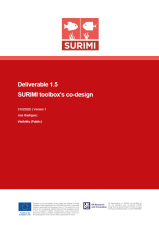
SURIMI aims to provide the world with easy-to-use and freely available tools that draw on expert fisheries dynamics models to better understand the effects of fisheries management interventions. Such expert models are rarely used outside the scientific realm despite their huge societal potential. SURIMI therefore aims to make them more easily accessible to non-experts. To this end, stakeholder engagement is a key component of the project.
The first of three stakeholder workshops was held on 11 February 2025. Its aim was to present the SURIMI project and the scientific models it will integrate to key fisheries stakeholders, understand these stakeholders’ needs and concerns, and collect their input to guide tool development and design. It was attended by 31 external participants representing policy makers, scientific advisory bodies, advisory councils, NGOs, the fishing industry and scientists.
The workshop consisted of seven sessions, which covered stakeholder data and decision-making needs and concerns, graphical user interface requirements, and in-depth conversations on the models that the project will integrate. The key interests and questions of participants were centred around four topics: model uncertainty, i.e. the realism of the models and their trustworthiness; the quality of the data used in the models and how this data will be standardised; how the integration of the different models will work and whether it will be able to improve the overall modelling results; and the potential of the SURIMI tools for users and decision-makers.
The workshop provided important insights for the SURIMI consortium going forward and very fruitful conversations between participants and modellers. The main findings from the workshop are outlined in this report, and will guide the development of the SURIMI Toolbox going forward.